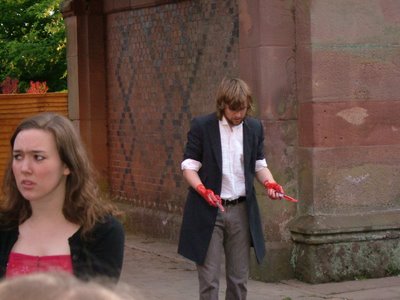Saturday, June 03, 2006
Macbeth's enduring modern message
 Readers will have to indulge a proud father on this one I fear. My son Markus starred as Macbeth in his (Keele) university (modern dress, outdoor) drama society production last night(picture shows him with Lady M. in post King Duncan mode). Seeing one's own son as the (very effective, if I am allowed to say) vehicle for such awful deeds was a bit scary I have to admit, but, having not seen a performance for some forty years, I also found the play instructive on a wider level.
Readers will have to indulge a proud father on this one I fear. My son Markus starred as Macbeth in his (Keele) university (modern dress, outdoor) drama society production last night(picture shows him with Lady M. in post King Duncan mode). Seeing one's own son as the (very effective, if I am allowed to say) vehicle for such awful deeds was a bit scary I have to admit, but, having not seen a performance for some forty years, I also found the play instructive on a wider level.It's a play about loyalty, betrayal and, most of all,('vaulting') ambition and conscience. Macbeth, and even his persuasive spouse too maybe are not intrinsically evil people but allow themselves to be taken over by it. The fact that they pay such a heavy price in terms of agonised consciences('is this a dagger..' and 'out damned spot') is arguably evidence of their innate goodness. 'Macbeth does murder sleep' he cries when contemplating his murder of Duncan: 'I am afraid to think what I have done.' What a dark play this is! It flirts with evil throughout; consider what must be one of the most frightening speeches ever written in a drama when Lady Macbeth summons up spirits to: 'Unsex me here;/ And fill me, from crown to the toe, top-full/Of direst cruelty'(I.iv)
Of course Macbeth soon adds to corpses on and off stage through bumping off Banquo and Macduff's brood, all in pursuit of achieving the crown and making it secure. But by then he was consumed by his inner dark forces. One wonders how long it took Stalin to graduate from his very first 'legalised' murder of a close comrade to the easy, routine, almost industrial despatch of, to take a random example, 40,000 Polish officers at Katyn Forest in 1941. One has similar thoughts about those other genuine monsters, Hitler, Pol Pot or Idi Amin.
In 1606, when the play was written, witches were not weird figments of the imagination but taken deadly seriously- King James actually wrote a book about them. In Macbeth we see them playing the role of modern, if somewhat eccentrically dressed pollsters. Ambition still drives politics, of course, but when things go pear-shaped, failed politicians don't have to face enraged Macduffs; they merely stop using Dorneywood. All this maybe, is what makes Macbeth still such a modern play, together, of course, with what it has to say about the current plague of knife crime...
Comments:
<< Home
Yes, a very proud moment for you. I am a big fan of the RSC and make an annual trip to The Globe each year. My younger son is going to study Macbeth next year, he is 13. He is also very theatrical and belongs to a leading drama group. He is a big fan of Billy Elliot and we are going to see it for the second time next month.
Post a Comment
<< Home





